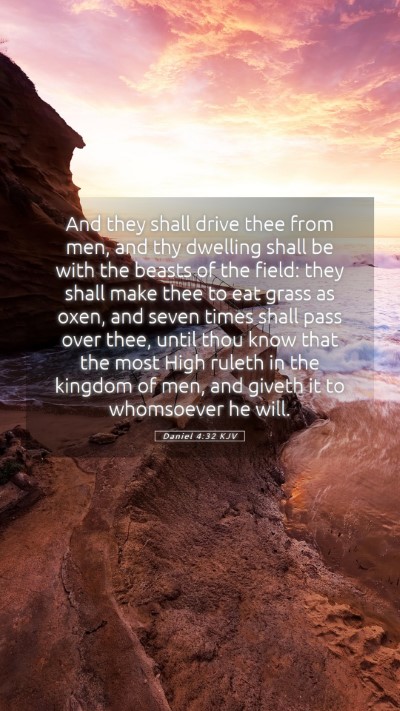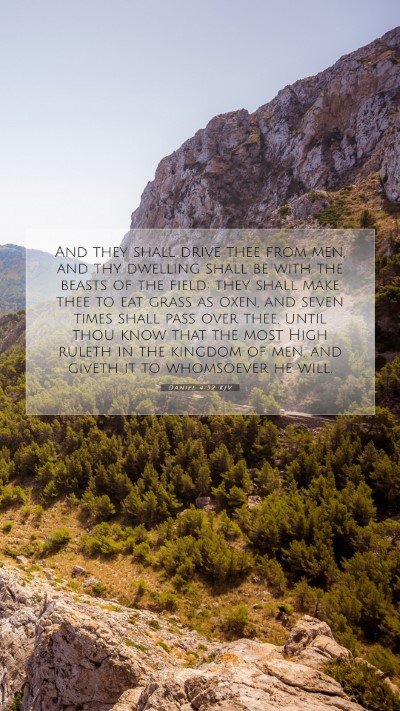Bible Verse Commentary on Daniel 4:32
Verse Text: "And they shall drive thee from men, and thy dwelling shall be with the beasts of the field: they shall make thee to eat grass as oxen, and seven times shall pass over thee, until thou know that the most High ruleth in the kingdom of men, and giveth it to whomsoever he will." (Daniel 4:32)
This verse, part of the account of Nebuchadnezzar's dream and its fulfillment, highlights God's sovereignty and the consequences of pride. The king, who had exalted himself above all, is warned through a divine decree regarding his eventual insanity and humiliation.
Analysis and Interpretation
The interpretation of this verse encourages a comprehensive bible verse understanding and bible verse explanations. Here are insights derived from public domain commentaries:
-
Matthew Henry's Commentary:
Henry emphasizes that this passage serves to illustrate God's authority in the lives of men. The driving out of Nebuchadnezzar symbolizes a significant humbling process, highlighting that even kings are subject to divine will. The phrase "eat grass as oxen" signifies a complete fall from power to a state of utter dependency and degradation.
-
Albert Barnes’ Notes:
Barnes discusses the "seven times" as a period of madness, indicating a complete cycle of judgment. He points out that this experience serves to teach Nebuchadnezzar the essential lesson of God's dominion over earthly kingship. The transformation from man to beast illustrates the stark disparity between human pride and divine wisdom.
-
Adam Clarke's Commentary:
Clarke provides historical context by explaining that Nebuchadnezzar's eventual acknowledgment of God's supremacy demonstrates a turning point. Clarke suggests that the king's punishment is a reminder of the fragility of human power and the necessity of recognizing the Creator's authority.
Significance of the Verse
This verse encapsulates vital themes for anyone studying the Bible, specifically regarding bible study resources and bible study tools. Here are key takeaways:
- The ultimate authority of God over all creation.
- The dangers of pride and self-exaltation against divine order.
- The lesson of humility that comes from recognizing one’s position before God.
- The concept of divine discipline directed towards both individuals and nations.
Cross References
Understanding this verse can be enhanced through these related scriptures:
- Proverbs 16:18 - "Pride goeth before destruction, and a haughty spirit before a fall."
- Isaiah 14:13-15 - The fall of the king of Babylon, emblematic of pride and downfall.
- James 4:6 - "God resisteth the proud, but giveth grace unto the humble."
Application of the Verse
In applying the meaning of this Bible verse to daily life, consider the following:
- Maintain humility in personal achievements and acknowledge God’s role in success.
- Reflect on the transient nature of earthly power and status.
- Recognize the importance of surrendering one’s will to divine authority for true peace.
Additional Insights
While studying, it's beneficial to explore in-depth Bible verse analysis, focusing on historical and cultural contexts. Understanding how ancient societies perceived divine governance can enhance Bible study insights:
- The significance of dreams in Biblical narratives and their prophetic implications.
- The role of rulers and kings in God’s plan, reflected in their behaviors and destinies.
- Lessons on repentance and divine mercy following periods of judgment.
In summary, Daniel 4:32 serves as a profound reminder of divine sovereignty and the necessity of humbling oneself before God, offering rich discussions in your bible study groups or online Bible study sessions.


